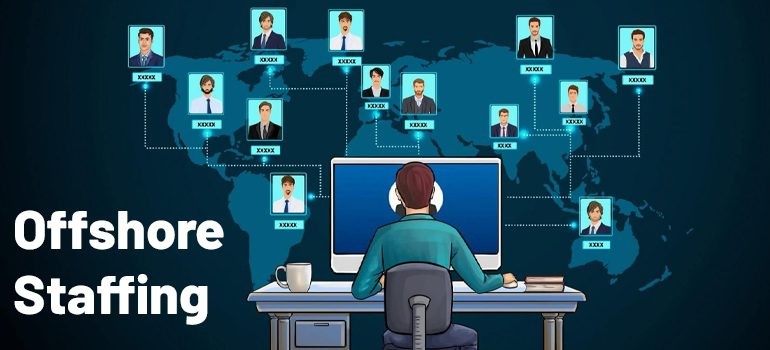Using Global Markets: Hiring Offshore Employees for International Growth
In today's globalized economy, increasing into worldwide markets has actually come to be a calculated necessary for services seeking development and productivity. One vital facet of this expansion is hiring offshore workers, that can bring one-of-a-kind skills, expertise, and perspectives to the table. However, efficiently taking advantage of worldwide markets calls for mindful preparation and implementation. This overview, "Tapping Into Global Markets: Hiring Offshore Workers for International Growth," offers important insights into the benefits of offshore employment, how to recognize target markets for offshore hiring, and how to browse cultural and lawful challenges. In addition, it provides ideal methods for remote team monitoring, making sure effective interaction and collaboration across boundaries. By leveraging the capacity of overseas talent, businesses can achieve lasting growth and acquire an one-upmanship in the international marketplace.
Benefits of Offshore Employment
The advantages of overseas employment lie in accessing a diverse talent swimming pool and accomplishing cost-efficiency for international growth. When a company determines to hire overseas workers, it opens up the chance to tap right into a worldwide talent pool.

Moreover, overseas employment permits firms to develop an existence in brand-new markets without incurring the costs related to physical framework and regional operations. By recruiting overseas employees, companies can expand their international impact promptly and cost-effectively. This enables them to offer global customers, penetrate brand-new markets, and remain in advance of the competitors.
Identifying Target Audience for Offshore Hiring
Increasing on the advantages of offshore employment, business need to now focus on identifying target markets for overseas hiring. This procedure entails careful consideration and analysis of numerous variables to make certain the success of worldwide development.
Among the very first steps in recognizing target audience is to identify the specific abilities and proficiency required for the overseas settings. This involves evaluating the firm's demands and recognizing the voids that can be loaded by offshore employees. A modern technology firm looking to increase its procedures may require software program designers or IT experts with specific shows skills.
Additionally, firms should consider the cultural and language compatibility of the target audience. It is critical to examine whether the overseas workers will be able to seamlessly integrate into the firm's job culture and connect successfully with the remainder of the team. This may need conducting market study and recognizing the cultural subtleties and language effectiveness of prospective target audience.
In addition, firms must examine the economic and political stability of the target audience. By considering aspects such as GDP development, rising cost of living prices, federal government plans, and labor regulations, companies can assess the long-lasting feasibility of expanding their operations offshore.
Navigating Legal and Cultural Difficulties
To successfully navigate the cultural and legal obstacles linked with offshore hiring, business should thoroughly consider various variables and apply critical techniques. One of the key lawful obstacles is conformity with neighborhood labor legislations and guidelines. Different countries have different work legislations, consisting of guidelines associated with working hours, earnings, advantages, and staff member legal rights. It is critical for companies to thoroughly research study and recognize these regulations to guarantee they remain in conformity and avoid any type of lawful problems or fines.
An additional essential aspect is understanding the cultural distinctions between the home nation and the overseas location. Cultural differences can influence interaction styles, work principles, Click Here and company methods. It is important for business to buy social training programs to help workers adjust and understand to the cultural standards of the overseas area. This can help promote far better partnership and performance among the overseas group members.

Ideal Practices for Remote Team Administration
When handling remote groups, it is crucial to establish reliable communication channels and methods. look at here These tools make it possible for real-time communication and collaboration, allowing group members to link and share information regardless of their physical location.
Along with interaction channels, developing clear protocols and guidelines is crucial for remote group administration. This consists of specifying assumptions, establishing target dates, and detailing responsibilities for each employee. By developing these methods, employee will have a clear understanding of their obligations and duties, which aids to advertise efficiency and responsibility.
Routine check-ins and development updates are also important for remote team management. This makes certain that every person understands the development being made and any potential obstacles that might arise. By having normal check-ins, supervisors can offer assistance and support to their remote staff member, cultivating a sense of unity and collaboration.
Lastly, advertising a favorable team society is crucial for remote group management. This can be attained with virtual group building tasks, acknowledgment and rewards for success, and promoting a inclusive and encouraging job atmosphere. By advertising a positive group culture, remote groups will really feel much more connected and involved, leading to raised efficiency and success.
Guaranteeing Reliable Interaction and Collaboration
- Carrying out robust interaction and partnership techniques is essential for effective offshore staff member recruitment and global growth. When recruiting overseas employees for global growth, it is essential to develop reliable communication channels to ensure smooth partnership amongst employee situated in different geographical areas.
Among the initial actions in guaranteeing effective interaction is picking the right devices and technologies (DreamHire). Using video conferencing, instantaneous messaging, and job management platforms can enhance communication and facilitate real-time collaboration. These tools allow groups to attach, share details, and interact despite their physical place
In enhancement to modern technology, it is important to establish clear communication page protocols and guidelines. This includes defining assumptions for reaction times, establishing routine check-ins, and setting guidelines for online meetings. By supplying an organized structure, employee can much better recognize just how to connect and collaborate successfully.
Language barriers can also position difficulties in overseas employment. To conquer this, companies can purchase language training for staff members, provide translation services, or work with bilingual personnel to promote communication. This makes sure that language distinctions do not prevent efficient partnership and understanding.
In addition, promoting a society of open communication and inclusivity is essential. Motivating employees to share ideas, ask inquiries, and provide comments promotes collaboration and advancement. Normal team-building tasks and digital gatherings can additionally aid foster a sense of camaraderie and reinforce partnerships amongst employee.
Conclusion
Finally, taking advantage of global markets via offshore employment uses many advantages for global development. Companies can access a larger swimming pool of ability, decrease prices, and gain multiculturalism. Identifying the best target markets, navigating lawful and cultural difficulties, and implementing finest practices for remote team monitoring are essential for success. Reliable communication and partnership are additionally vital to make best use of and guarantee smooth procedures productivity. By very carefully addressing these factors to consider, companies can harness the possibility of offshore employment for their worldwide growth strategies.
